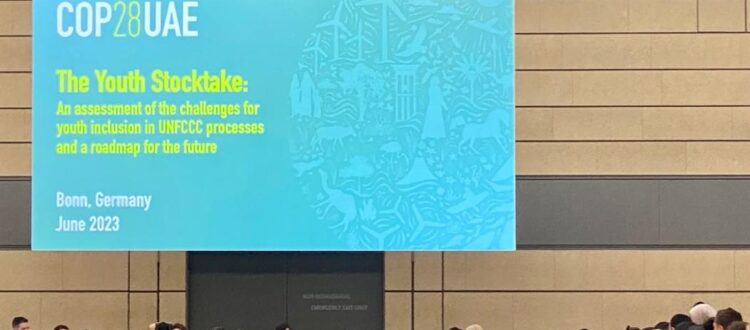THE PRESIDENT OF COP28 HAS ARRIVED IN BONN: MEETING WITH YOUNG PEOPLE
The fourth day of the intermediate negotiations saw the arrival of the COP28 President in Bonn: Sultan Al Jaber, who is also the CEO of the emirates oil company ADNOC, was greeted by civil society with billboards urging to move away from fossil fuels.
Al Jaber presided over an event strongly desired by the COP Presidency: the first “Youth Stocktake” ever organized before, or a discussion on the progress and obstacles encountered in youth inclusion in the UNFCCC processes. A sort of parallel but informal Global Stocktake on the inclusion of young people.
The President stated that his vision for the COP28 is ambitious and inclusive, because collaboration between all stakeholders is needed to achieve the goals of the Paris Agreement. In this sense, young people play a key role and therefore providing them with a space to take part in the conversation is a priority of the Presidency, assured Al Jaber. A priority that is reflected in the decision to designate a Youth Climate Champion, Shamma Al Mazrui, for the first time in history. Also new at the COP28 is the International Youth Climate Delegate Program, which has selected 100 young delegates from around the world to take part in the process, including representatives of vulnerable groups such as indigenous people, Least Developed Countries (LDCs) and Small Island Developing States (SIDS).
However, the ambition mentioned by Al Jaber is not accompanied, at least for now, by clear proposals on how the Presidency intends to contribute to a successful COP, especially regarding the crucial and sensitive Global Stocktake. Remarkably absent from Al Jaber’s speech is the elephant in the room: the need to abandon fossil fuels as soon as possible.
Furthermore, it will be necessary to evaluate whether the formal inclusion of young people and vulnerable groups – still on paper – will translate into practice. In this regard, the lack of interpreters made available by the organizers raises some doubts: as the representatives of YOUNGO (the constituency of young people of the UNFCCC) pointed out, several participants belonging to minority groups had to personally find an interpreter to be able to follow the event.
Despite understandable hesitations about the UAE presidency, YOUNGO urged Al Jaber to disprove the skeptics. He will have to demonstrate that he can really shed his role as an oil company CEO and step into the one of President of the COP28, and be a true advocate not only of youth participation but also of an ambitious decision in Dubai, with the necessary phase out of fossil fuels.
Italy, which in recent years has shown particular commitment to involving young people, also took part in the event by sponsoring for instance the Youth4Climate initiative, born as an event in partnership with the UK’s COP26 co-Presidency and now evolved into a long-term project in partnership with the UNDP and the UNFCCC. This year the event will be held in Rome and will be an opportunity for the selected young people to present innovative solutions to solve the climate crisis, with the winner receiving financial support to carry out his project.
Another program set up by Italy together with the UNFCCC secretariat is Youth4Capacity, the aim of which is to promote capacity building activities that give young people the tools to contribute to climate action, particularly in the most vulnerable countries.
In order to facilitate this participation, YOUNGO will soon publish a Youth Stocktake Report, an analysis of the progress (and gaps) in the inclusion of young people, particularly within the UNFCCC processes.
What are young people asking the UNFCCC?
- Accessibility, e.g. sign language interpreters and access for people with reduced mobility;
- Larger and more concrete representation in national delegations;
- Funding opportunities that enable young people to become policy makers, innovators and entrepreneurs;
- Capacity building through education and training;
- Formal acknowledgement of the contribution of Global Youth Statements to negotiations and youth policy proposals to COP decisions.
In particular, it should be emphasized the relevance of ensuring the inclusion of young people, which starts in the first place with the possibility of going to the negotiations at all. As YOUNGO reiterated, UNFCCC conferences are often organized in cities of the Global North, discouraging the inclusion of voices that also represent the most affected groups by the effects of climate change. Civil society has pointed out the inequality of these intermediate negotiations, with over 100 delegates facing difficulties in obtaining a visa for Germany. The involvement of young people in the UNFCCC processes, and more generally in all decision-making processes, too often risks being only a facade, nothing more than “youthwashing“, as it has been defined by YOUNGO representatives.
Article by Teresa Giuffrè, ICN Volunteer
Cover image: photo by Teresa Giuffrè

